Educational facilities are a crucial aspect of education establishments just as raw materials are to Industries. The availability or lack of infrastructural facilities and the overall environment in which learning takes place has a direct impact on the quality of education that students receive.
A school survey conducted by the 2017/2018 UNESCO Global Education Monitoring Report indicates that learning is often hindered by infrastructure in schools worldwide, particularly in disadvantaged schools.
Also, data from the Education Sector Support Programme 2009 (ESSPIN) on the state of education infrastructure in Nigeria estimated that 75% of public basic school infrastructure in some states in Nigeria are in poor condition.
In rural and some urban areas, many schools fail to meet the minimum requirements for safe and comfortable learning environments, the School for Arabic and Islamic Studies Fatara Dutse, Jigawa State is on the list of these schools.
Ten years after establishing the School for Arabic and Islamic Studies Fatara Dutse, the school still lacks important structures. Despite being a boarding school which requires adequate infrastructure to help facilitate effective teaching and learning, SAIS Fatara lacks most of this infrastructure as students have no better option than to use classrooms as both living quarters and learning areas.

Since 2014, only a dormitory block that could hardly contain 100 students, a toilet block, and a fence for the front of the school, along with a mosque and a cooking area with no dining hall, were built in addition to already established structures which are the five blocks classrooms, toilet and staff office. No further renovation has taken place until now. However, a new block of about six classrooms is currently under construction.

Additionally, the school lacks clinic facilities, electricity, proper fencing, and staff quarters. This has resulted in teachers also using classrooms or offices as sleeping rooms. Only five blocks of classrooms are available, two blocks are used as a dormitory and the other three as classrooms, making it crowded. The ceilings, doors, and windows are in a state of disrepair, and the classes and dormitory are left bare mostly without windows and doors.

Wikkitimes checked the dormitories and classes during the holidays, they were so bad and unkept that it could be mistaken for Animal Barn. The beds were jam-packed with dirty ragged nets and mattresses and a ravaged floor. This will impact negatively on students’ health and academic performance. The shortages of facilities have led to the stretching of available facilities resulting in a complete breakdown of the structures in place.

In an interview with WikkiTimes, the Assistant Director of the school for Arabic and Islamic Studies Fatara, Mal Zakariya Muhammad Tahir explains the situation students are facing due to the lack of these facilities and the government’s efforts to repair the school, which is currently in a dilapidated state.
“The school lacks structures and necessary amenities like dormitories, classrooms, Furniture, lack of proper fencing, electricity, library and others.
“We have more than 1,300 students with just 16 teachers casual and permanent combined. When students fall sick we clear a classroom as a sick bay for the main time and if the illness persists we take them to the general hospital”
“The school has enough space for more structures, you see the whole of this space plus the village behind us is for the school. It is said that the villagers will be evacuated and compensated, and the government can build more structures but I don’t know how true that is and if they have been compensated or not.”
“We don’t have staff quarters, the teachers and even the administrator use offices as sleep space. If you check the administrator’s office you will see his mattress by the side.”
“For almost ten years the school has had no light, it’s just two years ago that the administrator Garba Yaro wired the admin block temporarily to get light here at least.”
“ Although I heard that this government has a budget with the school in mind to build infrastructure but I don’t have the full details about that at the moment.”

A teacher from SAIS school Mal Aisha Sani Aminu conveys the difficulties the school is facing due to a lack of these amenities which are very crucial in students’ development and attention to learning.
“Let’s start with the dormitory. Students’ dormitories are crowded, there is congestion especially now that the weather is hot most of them sleep outside, also they don’t have enough beds and their toilets and bathrooms are not convenient.”
“The school has no electricity, no electricity in classes, sleeping areas or offices and we all know how important electricity is to boarding school students. With light, we can prepare the students for night Prep and group Tahafizul Quran (TQ) recitation instead of the use of torch lights which are sometimes not available which shows a big lack in the school.
“Also, classes don’t have enough seats; there is a class with more than 170 students in a classroom. We as teachers find controlling that number of students tiring. We find it hard getting the attention of students to concentrate on what we are teaching.”

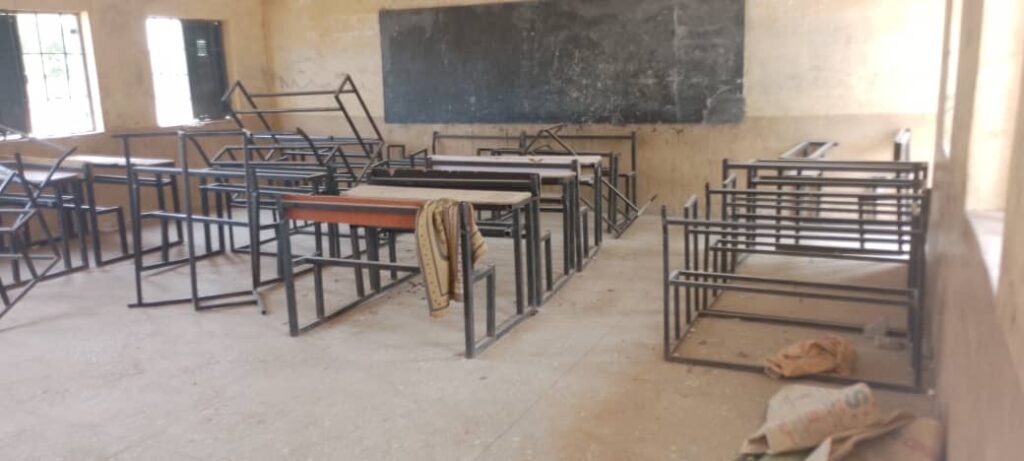
“Also water is a big issue here. We don’t have enough water here. The boreholes are just one in the school, we got an addition last term and the old one stopped working. We have a solar powered borehole which doesn’t work effectively during the cold season, so students with the aid of teachers or prefects have to go far into villages to get water as the sun hardly shines at that period to power the solar batteries.”
“Additionally, food is not enough, students get small portions of food which leaves them barely satisfied. This plays a role in dividing their attention and distracting their concentration to learning.”
“We don’t have a facility to call a sick bay; we convert classes most times as sick bay when needed. The director sometimes takes money from his pocket to pay for the student’s treatment. Most times public transports are used to convey them as there are no school buses.

“We don’t have enough teachers; presently we don’t have a math teacher. Our school forms one to six that is Jss1 to SSS3. The school has two arms that is SIS and Tahafizul Quran (TQ). We teach 14 classes with just one English teacher and no math teacher. We also lack teachers for the Islamic and Arabic classes.”
Among other lacks the teachers have no staff quarters, a classroom is demarcated into four sections for teachers to manage and sleep in. Some of these teachers come from Kano, Gwaram, Birnin Kudu etc. This can have a very big effect on students’ manners and learning.
Female Teachers don’t have restrooms to themselves which makes it uncomfortable, especially during their menstrual period.
“A little cubicle from the divided four section classroom is what we use to change or check ourselves and clean up.”
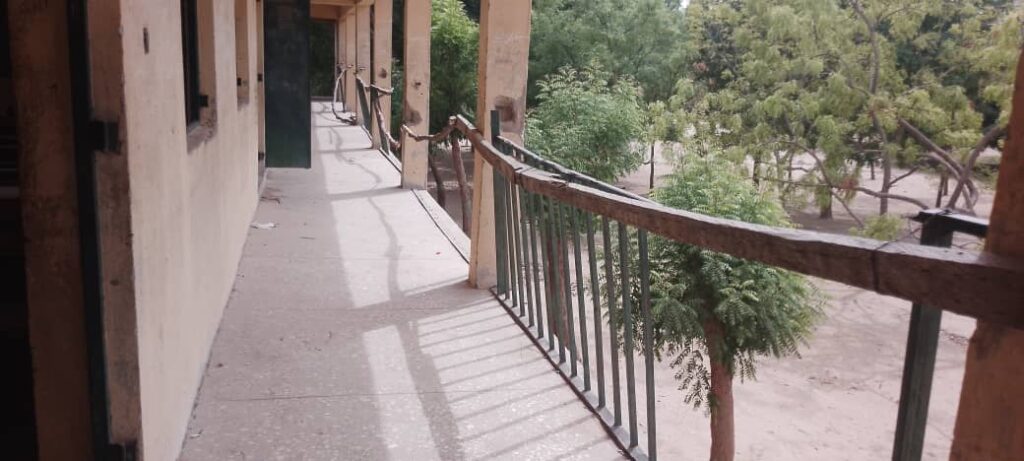
Another teacher Mubarak Yunusa, a teacher of Islamic Studies, said students have the right to get comfortable places of learning, food and a well-equipped environment.
“Students have a right to good infrastructures, food, clean water and a conducive environment which is lacking here. The school needs water so that students don’t go far out to get water. Their dormitories need the addition and renovation of old ones. Some students sleep outside come sun, come rain for lack of space or bed to sleep on.”

“Also their classes need repair, you can find a class with 200/250 students but due to few classes, students have to squeeze into one. There is also a need for a library in the school knowing the importance of a library in a school environment like ours. Lastly is Staff quarters, this will bring teachers closer to students, to be able to control student movement during and after classes. ”

A student who is the Head prefect of the school Mujittafa Said also voiced out the difficulties students face in the school.
“Our first problem is the dormitory where students can hardly sleep during the rainy season because of the torn ceilings and licking roofs. And during the heat period, the dormitory is too crowded so students rather sleep outside under the trees.”
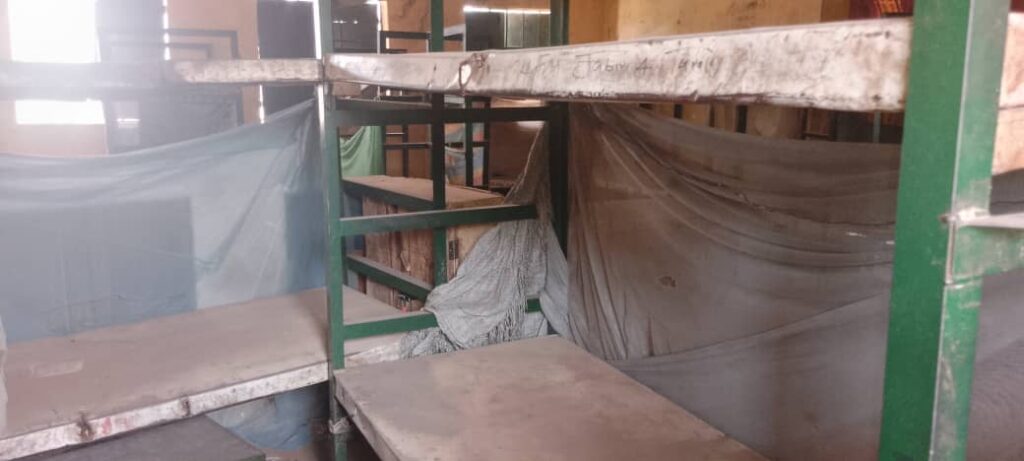
“We also lack water as one of our boreholes is faulty; Water is not enough, to cook for us we have to go out to get water. Our classes need renovation as some are without doors or windows. We have about 130/150 in a class or less. The school needs to be completely fenced as students sneak out through the barbwired fence most time.
“Also no electricity in the school, even the one on the admin block was wired by the school administrator when he started here. We are in need of Maths, History, and English teachers, we don’t have enough teachers here but the teachers here with us are doing their best to take care of us.”
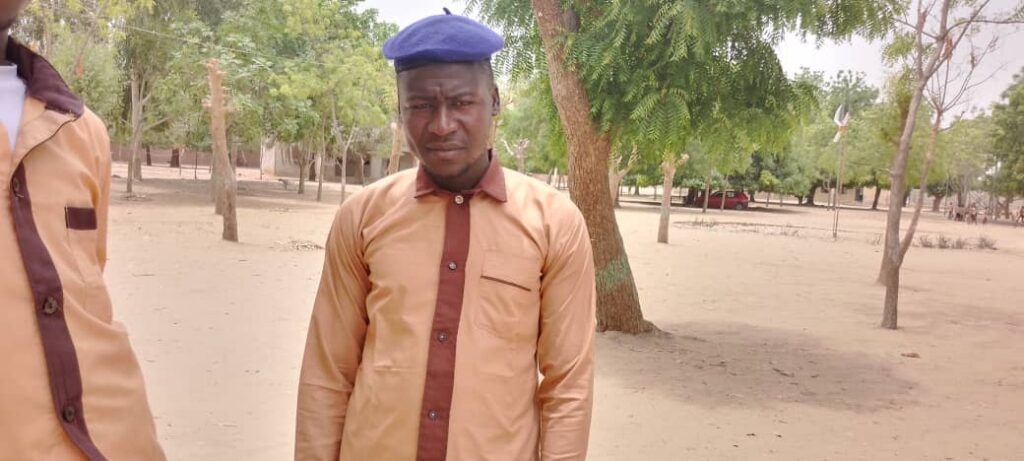
Another student a house prefect Jabir Abbas complained about the state of the school.
“We have hostel issues, students mostly sleep outside and that has caused illnesses associated with cold, dust etc.”
“Our classes are crowded, some students sit on the floor due to a lack of chairs and tables. The rainy season is scarier than now because most hostels and classes, especially upstairs, are mostly flooded due to rain coming in through the ceilings and windows, destroying our things. Sometimes we have to use plates to pour out the water after the rain. We need more hostels, the one provided; I think the last three years can’t comfortably accommodate l00 students and the classes turn into hostels need renovation too.”

INVESTIGATION: High Cholera Disease and Death in Bauchi are fuelled by Poor Hygiene
Sabon Fatara
Sabon Fatara is a community behind the School for Arabic and Islamic Studies SAIS; it is said that it was in the then government of Sule Lamido’s plan to evacuate people from the community to a different location to help expand the school further. The expansion never happened during Sule Lamido’s tenure in 2014/ 2015, during the tenure of Badaru Abubakar the houses and farmlands in Sabon Fatara were evaluated and papers given but compensation didn’t happen, although there are rumours that they have been compensated. To confirm if the people have been compacited by the government as rumoured WikkiTimes paid a visit to the community of Sabon Fatara.
The people of Sabon (New) Fatara originally were from Tsohon (Old) Fatara, a community in the old town near the rock. In the early days when Jigawa became a state, there was a quarry company named Sterling, whenever this company was about to break rocks the residents of old Fatara were asked to leave home because of the noise and discomfort that came with breaking rocks. The people stay out far from their community under trees until the company is done quarrying for the day, then the community go back home to broken clay pots and plates, destroyed by flying rocks, zinc roofing punctured, and rocks scattered everywhere even in the inner rooms, on their beds.
The company or government at that time never compensated them in any way. The Sabon Fatara community decided to contribute money among themselves and get a new community far from the quarry. That was what brought them to Sabon Fatara.
The people of Sabon Fatara are crying to the government to please allow them to stay in their homes, they don’t want compensation as nothing the government will give them will equate to their homes
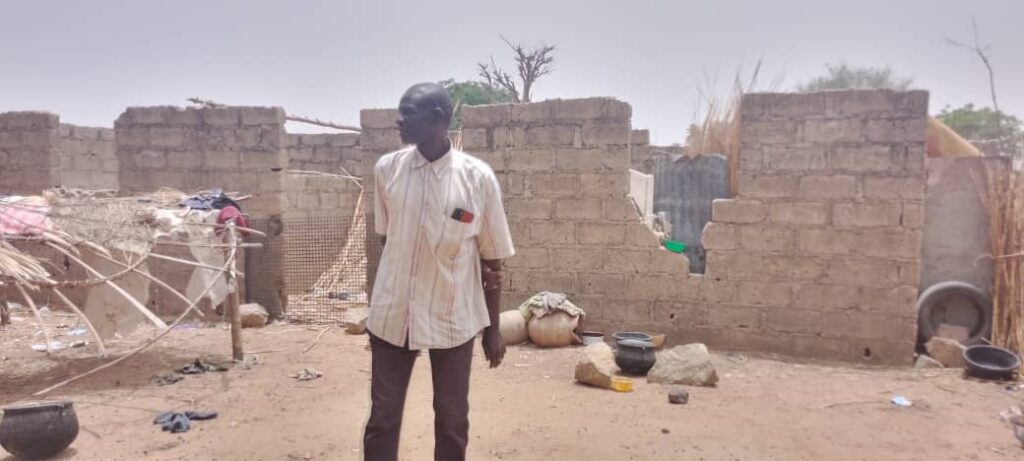
Speaking, a community member from Sabon Fatara Mal Yau Usama called on the government to please, instead of evacuating them, stretch out the school towards Horizon FM as the houses there will be easier to evacuate due to their small number compared to theirs.
“The government is yet to pay us and for more than 10 years that is since Sule Lamido‘s Administration 2014 government, they only talk about us evacuating with no specific date or compensation.”
“Two years ago the government was here to evaluate the houses, every resident’s name was taken and we were promised payment by the former government of Badaru Abubakar which never happened. We were stopped from building more houses, even people whose houses were flooded during the rainy season couldn’t rebuild as the instruction was to stop all buildings. My house was supposed to be roofed about three years ago as you can see it’s without roofing.”

“We went to the Ministry of Lands on different occasions to complain about the situation but nothing has been done so far to help us.”
“Now that the rainy season is near, we are no longer evacuating. We are now all relaxed and have started rebuilding our homes and given visitors land to build on. Now houses have tripled the former number.”
“Our community doesn’t lack Water and light; it is a peaceful community. The government should please hear our cry. We don’t want compensation as nothing the government will give us will equate to our homes. We know it has the final say; it should please hear our plea.”
Also, another resident Mal Umaru Baban Kwashai pleaded with the government to please hear their cry and leave them in their community.
“For more than ten years now the government restricted us from building our lands and renovating our houses, a lot of people died while waiting for the government to give them approval to use their land. A man got sick and needed money for treatment but couldn’t sell his land because of the restriction. He later died of the illness.”
“We are peaceful people pleading with the government to please allow us to stay in our community and permit us to use our lands. We know that the present government has our best interest at heart; the governor cares about the wellbeing of his people so we are pleading with him to look into our interest.”

Islamic Education Bureau
To enquire about the fate of the school and to confirm if the present government has budgeted for the school, Wikkitimes paid the Islamic Education Bureau to visit office of the Executive Secretary Dr Mubaraq Abdulwahab Hassan who confirmed that the school is in the second quarter budget and every lack in the school will be taken care of at once.
“We are aware of all the problems you mentioned about the School for Arabic and Islamic Studies Fatara Dutse, we have started looking at its issues already.
“We discussed with the governor Mal Umar Namadi and every necessary action the school needs has been put in this year’s budget. Things like building new classes, building more dormitories, and staff quarters. Already the construction of a new class block is ongoing.”
“The fencing of the school will also be completed soon, as you can see the fencing is only done on the front of the school, only barbed wire was used at the back. This has been included on the list of things to be taken care of, work will fully start in the second quarter which is next month God willing. On the issue of electricity, we are already talking with the Ministry of Works and they are on it.”

“Also about the compensation of the villagers, I spoke to the Commissioner of Lands yesterday and he promised to look into it and any bridge will be sorted out.”
Islamic Education Bureau Budget 2024
To confirm if the School for Arabic and Islamic Studies was truly included in Jigawa’s 2024 budget. WikkiTimes looked up the Jigawa State Procurement Plan for Works and Goods Contracts Ministry/Agency Islamic Education Bureau Budget 2024 and discovered that the state budgeted N100 Million for the following;
compensation and wall fencing, provision of electricity, additional student hostel and renovation of existing ones, and the construction of staff quarters. The budget plan with the economic code 051700200600/060023 was procured through selective tender.
Ministry of Lands
WikkiTimes on its visit to the Ministry of Lands to inquire about the state of the community and expansion of SAIS was granted an Interview with the Director of Lands Dahiru Lawal, where he confirmed that the paper of ownership has been given but compensation is yet to be given to the community.
“Papers of ownership have already been given to the villagers whose land falls within the demarcated space. The government has planned out a location to resettle the people whose farms fall within the location.”
SAIS school has already been expanded, the fenced area is the said space needed for the school which crosses into some people’s land and farms but I don’t know if there are plans to expand the school further.”
“To compensate the community people whose land falls within the demarcation reassessment must be done as a lot has changed since the first evaluation. The evaluation is being reviewed and followed accordingly.
“We hope the government will pay compensation so the layout can be implemented.”
The Commissioner Ministry of Lands mentioned that the new compensation plan will be used to compensate the community after the reassessment has been done.
With all things being equal, we are assuming work on the renovation and construction of SAIS school should make heads by June next month. This is because the Budget plan implies that the contract and offer were approved between the 25th – 29th of April which was exactly a week after WikkiTimes visited the Islamic Education Bureau, this shows that the Jigawa State government is working accordingly to see that the needed projects are executed on time ahead of the raining season. There will be a follow-up by WikkiTmes to help the government ascertain the level of compliance by those who will be handed the responsibility of making sure the job is done.
This investigation is produced with support from the Wole Soyinka Centre for Investigative Journalism (WSCIJ) under the Collaborative Media Engagement for Development Inclusivity and Accountability Project CMEDIA funded the MacArthur Foundation.




